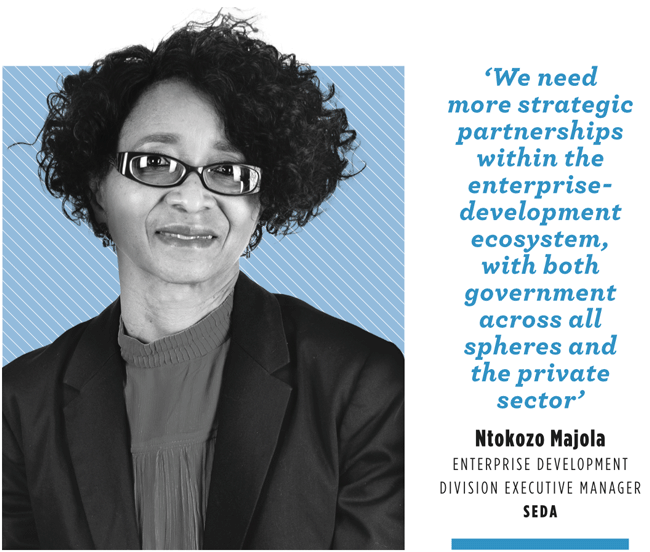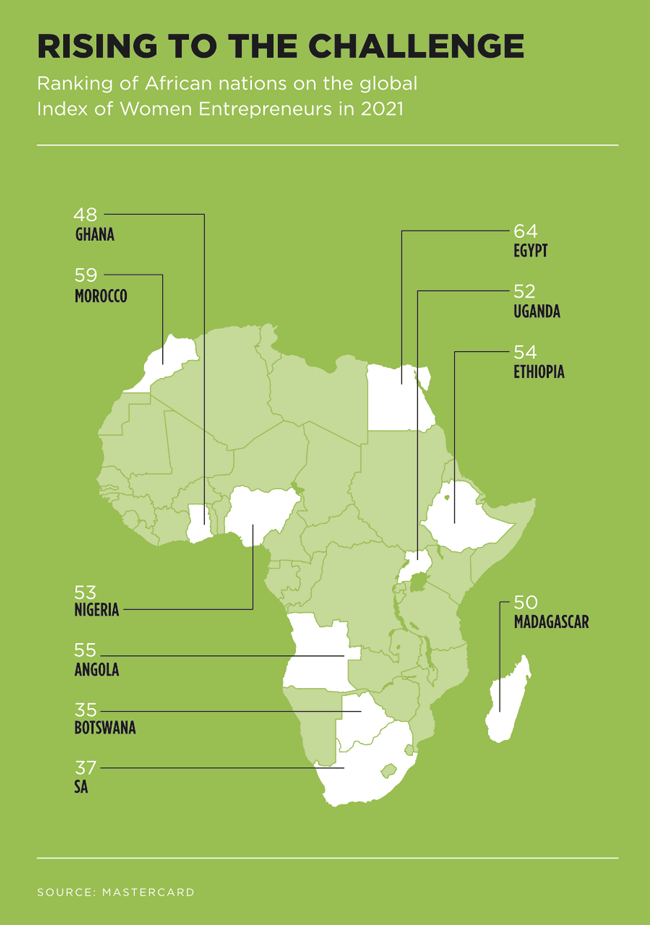Global economic recovery depends on investing in women entrepreneurs. This is the title of a 2021 Mastercard fact sheet based on its global Index of Women Entrepreneurs released in the same year – and it’s also a fact. Entrepreneurship is the foundation of post-pandemic recovery in any every economy, but perhaps none more so than SA.
Well more than a third of the population is unemployed – of whom about 48% are female – with some predictions putting SA on a trajectory to between 40% and 50% unemployment by 2030 if current trends prevail. The economy isn’t getting any closer to providing enough jobs to absorb the unemployed, making entrepreneurship – namely, SMEs – the only viable avenue for economic participation (and survival). Financial analyists argue that SMEs will be key to SA’s economic recovery, with current estimates of SME contributions to the economy varying between 30% and 60%.
There is a strong economic case for investing more specifically in women entrepreneurs or women-owned SMMEs in rural areas. The International Labour Organisation has long argued that ‘rural women’s entrepreneurship can contribute to economic growth in developing countries and clearly represents an untapped potential’. UN Women, meanwhile, notes that ‘rural women are key agents for achieving the transformational economic, environmental and social changes required for sustainable development’.
Perhaps most compellingly, when women lift themselves out of poverty, they take their families and communities with them. ‘To the extent that higher spending on children promotes human-capital accumulation, this suggests that empowering women may ultimately lead to faster economic growth,’ says the Institute of Labour Economics. USAid confirms this, noting that ‘women in poor countries are more likely than men to spend their income on food, education and healthcare for their children – creating powerful, positive and measurable benefits to society’.

So what is the current state of entrepreneurship among rural women? No recent studies have been done on this demographic that give a general idea of how many SMMEs – which could be anything form spaza shops to small-scale vegetable farming, to hairdressing to crafts or seamstress services – are run by rural women, let alone their direct and indirect contribution to the economy.
Some clues exist in the Mastercard Index of Women Entrepreneurs (MIWE) – now in its fifth year – which found that ‘despite the gender gap and the impact of the COVID-19 pandemic, women in South Africa are making progress as entrepreneurs, indicating a strong will and determination to survive’. SA moved up one place overall from 2020 to rank 37th out of 65 economies on the index, and rose two spots on the Women Business Owner benchmark to 44th, with 21.9% of all businesses owned by women in 2021 versus 21.1% in 2020. SA was one of just 12 economies where women’s entrepreneurial activity rates increased.
While funding for women-owned SMEs, the cutting of red tape to ease their access to resources and the economy, as well as integration into supply chains are action points that have received some backing from government, NGOs and the private sector, one important strategy that needs equal weight is the incentivising of rural women to choose entrepreneurship as a viable vocation earlier in life, rather than as a survival strategy when they feel all other options have been exhausted. Tellingly, the MIWE found that growth in SA’s female entrepreneurism is likely spurred by various factors, including a high increase in ‘female necessity-driven entrepreneurship’.
The Small Business Development Agency (Seda), under the Department of Small Business Development, has made some inroads. ‘Seda has partnered with youth development specialists Primestars in the Step Up 2 A Start Up programme to cultivate a culture of entrepreneurship among school learners, especially those from disadvantaged communities including rural areas,’ according to Ntokozo Majola, executive manager of Seda’s enterprise development division.
‘This programme, which ensures that it has a decent representation of girls, entails a national youth entrepreneurship competition, a boot camp and exposure to entrepreneurship through a cinema experience for around 10 000 learners.’ In the 2021/22 financial year, 31% of SMEs and co-operatives supported by Seda were youth owned, she adds.
While these initiatives may not be aimed specifically at rural girls and young women, there are surely those who benefit. Unfortunately, as the tide of unemployment rises, efforts of this kind are but a drop in the ocean.
‘We need more strategic partnerships within the enterprise-development ecosystem, with both government across all spheres and the private sector,’ says Majola. ‘We need big businesses to play a more meaningful role.’
While much private-sector CSI spend goes towards youth and supplier-development programmes, the upliftment of women and nurturing rural communities, little is directed specifically towards kindling an entrepreneurial spirit among rural girls and women. Yet there are an increasing few who recognise the long-term benefits this has the potential to reap.

One long-standing programme is PwC South Africa’s Faranani Rural Women Training initiative, launched in 2006, which has seen 3 909 women graduate from its programmes. More than 70% of women who have completed this programme – which equips them with practical business skills to advance their informal businesses to SMME status – have increased profitability in their businesses.
Earlier in 2022, the Momentum Metropolitan Foundation partnered with Agri Enterprises to launch the Women in Farming programme. Starting in KwaZulu-Natal, the initiative will see 60 female agri-entrepreneurs participate in a business-pitch approach to provide them with an opportunity to sell their agriculture business ideas to a panel of industry experts. Selected entrepreneurs will be trained and mentored by the Agri Enterprises sustainability and rural development division.
In 2018, the Southern African Institute of Learning (SAIL) – a private education and training institute that provides accredited courses across different industries – pledged free SME development training valued at R5.6 million to 1 956 disadvantaged women on the institute’s e-learning platform, in commemoration of the 1956 Women’s March to the Union Buildings.
‘A hundred women were recruited for the SAIL 1956 Programme from the rural part of Nquthu in KwaZulu-Natal,’ according to Vimala Ariyan, who was the CEO of SAIL at the time and has since moved on to ADvTECH’s Star Schools. ‘We chose Nquthu because we discovered that in this area were groups of women working together informally and collaborating on projects in […] farming, pottery, beading and dressmaking.
‘These women did not consider what they were doing “business”. It was a means of survival and they continued to do it, passing skills on from generation to generation, without bringing in anything new.’

Ariyan and her team delivered the SAIL Business Empowerment programme on a mobile app that they had developed in India, which taught women in Nquthu basic business skills such as marketing, costing, budgeting, sales and communication.
‘It was amazing to see how the women who understood the programme better shared their knowledge with the women who didn’t. The entire programme became the focus of this community and gained support from all,’ she says. ‘We got feedback from the office of the traditional leader – post-pandemic – that these women were self-sustainable and managed to keep themselves afloat during the pandemic.
‘The training SAIL did was delivered only over a few months at a very basic level. Had we had the opportunity to take these women through a longer, more detailed programme, we would have. However, funding was limited, and after a year of monitoring, we were hit by the pandemic.’
Ariyan can testify that training young women in rural areas in entrepreneurship skills ensures that both the beneficiaries and their communities benefit. ‘The younger they are when given all the above and supported on their journeys, the better the chances we, as a country, have to ensure that rural women in all areas are able to enhance the quality of their lives,’ she says. ‘With the right training and support, we have the possibility of seeing rural women – including grandmothers –equipped with the ability to electrify their villages with solar energy and enhancing their poor living conditions. This is just one example of the potential to bring change to neglected communities.’








